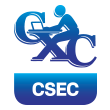Performance in the 2015 January sitting of the Caribbean Secondary Education Certificate (CSEC)
examination continued the up-ward trend seen over the last two years. This year, 58 per cent of subject
entries achieved acceptable grades, that is Grades I – III, compared with 50 per cent in 2014 and 49 per
cent in 2013.
Of the 13 subjects offered at the January 2015 sitting, performance improved on 11 subjects and declined
on two subjects.
Mathematics, the largest subject taken at this sitting recorded substantially improved performance this
year, with 65 per cent of the nine thousand subject entries achieving acceptable grades. Fifteen per cent
of the entries achieved Grade I; sixteen per cent achieved Grade II and 32 per cent achieved Grade III.
Performance on both English A and English B continue to improve when compared to last year. This
year, 55 per cent of entries achieved acceptable grades in English A, compared with 51 per cent last year.
There was a ten per cent improvement in performance in English B. Seventy-one per cent of subject
entries achieved acceptable grades this year compared with 61 per cent last year. Over fifty per cent of the
entries achieved at the higher grade bands, Grades I and II; 20 per cent achieved Grade I, 30 per cent
achieved Grade II and 20 per cent achieved Grade III.
In the business cluster, Principles of Accounts (POA) and Principles of Business (POB) recorded
improved performance when compared with 2014. For POA, 59 per cent of subject entries achieved
acceptable grades compared with 53 per cent in 2014, while for POB, 75 per cent achieved similar grades,
compared with 71 per cent in 2014. The other business subject, Office Administration was one of the two
subjects with a decline in performance this year. Fifty-two per cent of entries achieved acceptable grades
this year compared with 76 per cent in 2014.
Of the four science subjects offered at the January sitting, three recorded improved performance while
performance declined on one. Sixty-one per cent of entries achieved acceptable grades for Biology
compared with 53 per cent in 2014; forty-six per cent achieved acceptable grades in Chemistry compared
with 37 per cent in 2014, and 57 per cent achieved acceptable grades in Physics compared with 49 per
cent last year. Performance on Human and Social Biology continues to decline with 27 per cent of entries
achieving acceptable grades this year compared with 34 per cent last year.
There was a 12 per cent improvement in performance in Information Technology this year when
compared with performance in 2014. This year 62 per cent of entries achieved acceptable grades
compared with 50 per cent in 2014.
1
Spanish and Social Studies had moderate improvement in performance when compared with 2014. For
Spanish, 71 per cent of entries achieved acceptable grades compared with 67 per cent in 2014, while for
Social Studies 54 per cent of entries achieved acceptable grades compared with 47 per cent in 2014.
This year, 16, 689 candidates wrote the January sitting and they submitted 40, 938 subject entries.
Entire Sitting E-marked
For the first time in its history, CXC used electronic marking (e-marking) to mark all the scripts
submitted in an examination sitting. All papers in the 13 subjects were e-marked by just over 600 markers
in this year’s January sitting. This is to set the stage for the eventual move to full e-marking by 2017
when most of the CSEC and CAPE subjects will be e-marked.
During the 2015 May/June sitting, 18 CSEC subjects and 12 CAPE Units will be e-marked.
“The January sitting is relatively small and CXC felt that e-marking the entire sitting would provide some
good insights into what is to be expected in May/June when we would have more subjects and more e-
markers,” stated Mr Glenroy Cumberbatch, CXC Registrar. “As we plan for the May/June sitting, we will
implement the lessons learnt from this exercise and adjust our plans and strategies before we roll out e-
marking to other subjects in the coming years.”













